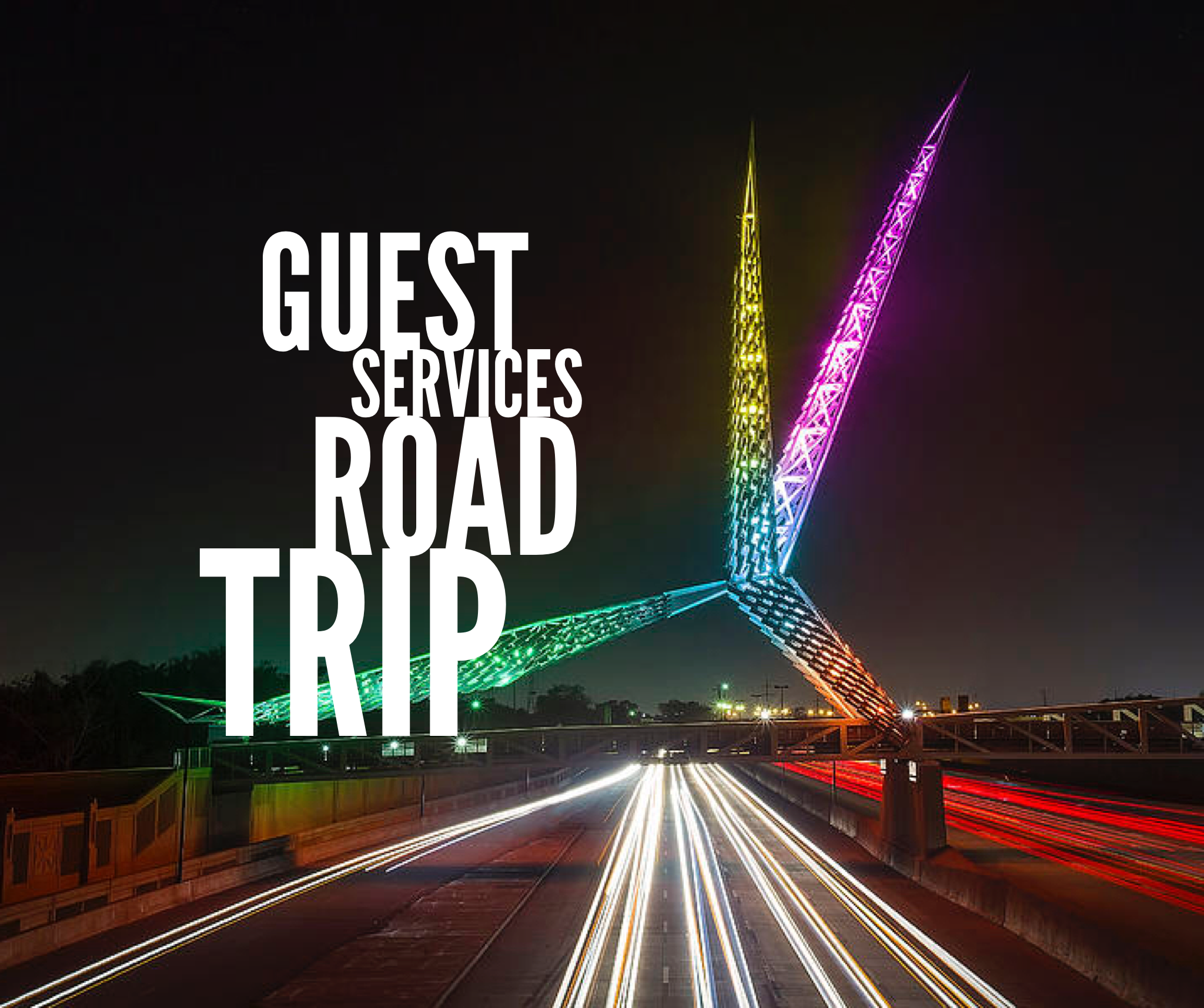Bridgeway Church (Oklahoma City, Oklahoma)

Each month, we revisit a series of posts called Guest Services Road Trip. We’ll travel the country from the comforts of our couches, interviewing leaders who are in the trenches of ministry. Do you have an idea for GSRT destination? Have a leader I need to talk to? Want the inside scoop on churches that seem to be doing this hospitality thing really well? Let’s talk.
 Kelcy White is the Connections Pastor at Bridgeway Church in Oklahoma City, Oklahoma. Bridgeway is led by Dr. Sam Storms and is a church committed to both Word and Spirit. They place equal emphasis on the functional authority of Scripture along with the pursuit and practice of New Testament spiritual gifts. On a typical weekend at Bridgeway, you’ll hear a 45-minute expositional sermon, experience 30 minutes of expressive worship, and may even hear someone give a prophetic word. Bridgeway sees an average weekend attendance of 750-800 people.
Kelcy White is the Connections Pastor at Bridgeway Church in Oklahoma City, Oklahoma. Bridgeway is led by Dr. Sam Storms and is a church committed to both Word and Spirit. They place equal emphasis on the functional authority of Scripture along with the pursuit and practice of New Testament spiritual gifts. On a typical weekend at Bridgeway, you’ll hear a 45-minute expositional sermon, experience 30 minutes of expressive worship, and may even hear someone give a prophetic word. Bridgeway sees an average weekend attendance of 750-800 people.
Kelcy has has attended Bridgeway for six years and he has been a part of the staff team for the last two. You can connect with him via email.
What are the top three books you’ve read on the topic of guest services and/or volunteerism?
Be Our Guest (Kinni), Servanthood as Worship (Palmer), Setting the Table (Meyer)
Talk about your assimilation process. What specific steps do you have to move someone from first time guest to a follower of Jesus?
At Bridgeway, our community groups are the primary means of community and pastoral care beyond Sunday mornings. We don’t consider someone fully “connected” until they have joined a group. However, we realized about a year ago that moving from the visit on Sunday morning to simply showing up at a stranger’s house was an impossible leap for most people. So we created some more realistic next steps.
First, we invite anyone who is new or unconnected to Bridgeway to a monthly event called Coffee With The Pastors. At the event, people can meet the pastors and elders, learn more about what we believe, ask any questions they have, and hear about ways to get further involved.
From there we encourage them to jump into an existing group (if they feel adventurous), or attend the Connect Course—a six-week small group experience taught by the pastoral team in which we build and launch a new community group around them. This is great because everyone is the “new guy” and the groups get to begin by hearing about our vision for discipleship in the context of community on mission.
What is one of your best practices / ministry hacks that you’re especially happy with?
I’m pretty happy with Coffee With The Pastors. I’ve found that about 75% of the people who attend will end up serving somewhere on Sunday morning and/or joining a group. We’ve had a little over 200 people come through since we launched the event last January. That’s about 15% of our regular attenders.
We also schedule our membership class for the two weeks following the Connect Course. This way, once somebody has been able to connect to Christian community within Bridgeway, they’re invited to simply “return next week” to begin the membership process at the same time and place.
What is a challenge you’re currently facing on your Connections Team?
We’re in the middle of a huge shift in our volunteer culture at Bridgeway. We’ve moved from a culture of “we’re a family and everyone does the dishes,” to calling people to serve as a means to grow in spiritual maturity and increase their joy in Christ. It requires new systems to be built (entry assessments, ongoing training, leadership pipelines, opportunities for discipleship, etc.). We’re essentially having to rebuild a plane in midair. Embedding this DNA into the culture is also challenging. I had to spent the last few years building relationships and trust with my volunteers (some who have served longer than I’ve attended the church) while restraining myself to only making incremental changes. I think we’ve finally reached the point that our volunteer culture is ready for a more dramatic shift. The process of communicating and rallying people around a new vision has stretched me as a leader.
What has been one of the biggest mistakes you’ve made in leading your team and/or implementing a guest services culture?
I think one of the biggest mistakes I’ve made is allowing my disposition toward perfectionism and fear-of-man to influence my leadership. Though a pursuit of excellence can be God-glorifying, perfectionism stalls progress and betrays a sinful belief that the mission of God is somehow dependent on my own performance. We’re also called to “speak the truth in love” to one another. It may feel easier to only affirm volunteers while overlooking areas that need correction, but it’s not what’s actually what’s best for the ministry or their own growth in Christ.
What is an idea you’d like to experiment with or implement over the next six months?
I have over 100 volunteers that I oversee throughout the course of a month. It’s impossible to have any meaningful relationship with that many people. Therefore, I’m raising up leaders to divide up the span of care. My first step in the process is to launch a one-month cohort in which I’ll gather potential leaders to read and discuss Nate Palmer’s Servanthood as Worship. It’s one of the most helpful books I’ve found for articulating a biblical view of servanthood within the church.
I also want to launch a recurring entry training for anyone serving at Bridgeway on a Sunday morning. Most of our volunteer training is on-the-job, and forced to focus on tasks. However, we need an opportunity to form the hearts of our volunteers as they enter into their roles. We want them to see their role as contributing to the mission of God before they ever hand out a bulletin or toast a bagel.
See all posts in the Guest Services Road Trip series.
Disclaimer: FTC watchdogs want me to tell you that if you order a resource from a link on this page, I may receive a small affiliate commission from Amazon. If that bugs you, feel free to bypass my link and buy from a vendor of your choice. But still: buy it. I only promote items that have benefitted me and that I believe will benefit you.
